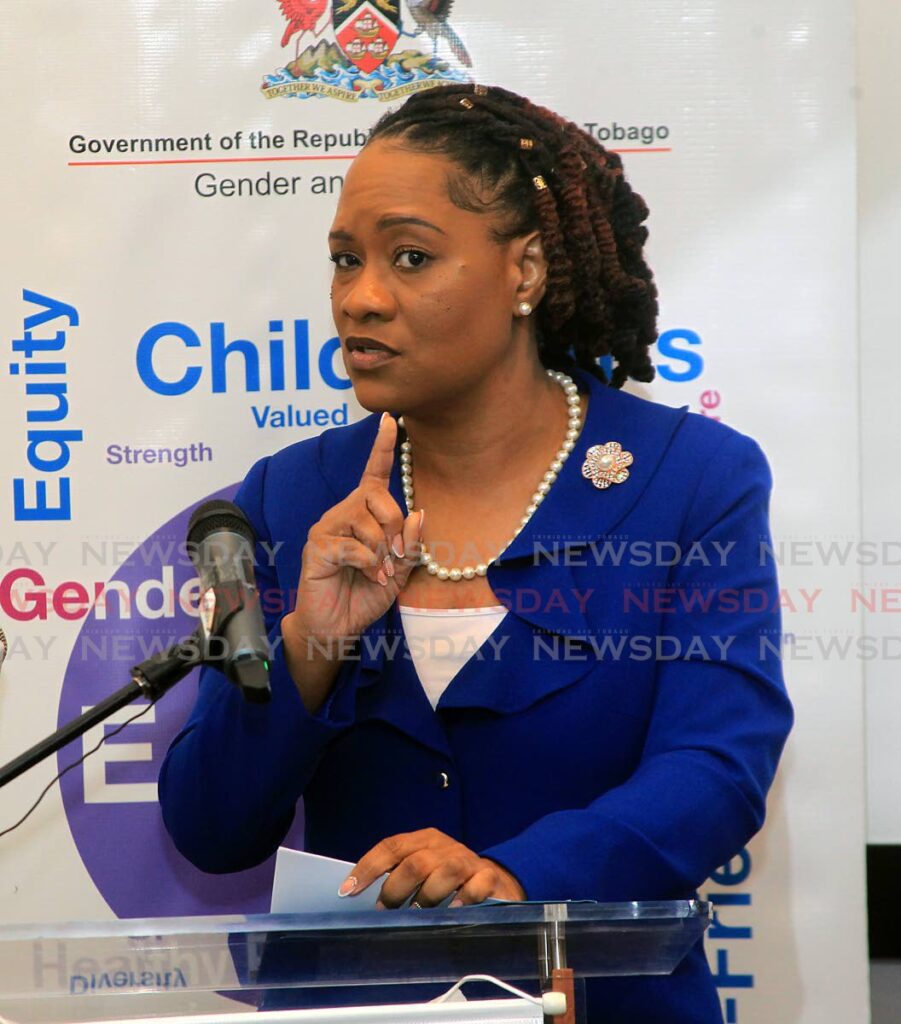National Children's Registry to serve as central database

Minister in the Office of the Prime Minister with responsibility for Gender and Child Affairs Ayanna Webster-Roy said the National Children’s Registry (NCR) is envisioned as a practical tool for monitoring child development and decreasing child abuse, neglect, and exclusion in TT.
At the launch of the registry at the Brix, Autograph Collection, Cascade, Port of Spain, on Friday, Webster-Roy said the initiative will revolutionise the current childcare and protection regime.
“The NCR is a government data management and sharing system that would serve as a secure holding bay for information on children across the country, including young adults transitioning from our childcare institutions, and children with disabilities. It is the first of its kind in the Caribbean, and is based on the identified gaps in our public systems in order to recognise and address developing issues as we strengthen the entire government approach to childcare and protection.”
She said the division had coordinated and planned cross-sectoral activities to ensure they were one step ahead of child abuse.
“The NCR will provide a common platform for information to be updated directly from systems now in use at various ministries and agencies that have direct contact with children in their service delivery. This initiative demonstrates the government’s commitment to incorporating technology into how we do business by establishing the registry as a digital child protection mechanism to monitor and track children’s development and achievement of important milestones.”
Webster-Roy said the registry will track if children are meeting their developmental milestones such as school attendance, vaccination, and receipt of grants and other services due to them. She said it would act as a preventative measure to identify if services due to a child are not being received or accessed, which could help pinpoint possible abuse or neglect, which will be flagged and child-related ministries and agencies responsible will be alerted to investigate.
The platform was created by BMAK Consultancy. CEO Peter Neckles said each ministry would only be able to access their section of the website, where specific people assigned to data entry would update the records. He said there were nine levels of access to the site, with level nine having the least amount of access. He said the only person who would be able to access all the information on the database would be the NCR coordinator, who would have level one access.
Neckles said stakeholders who would be updating records on the website are the Ministries of Health, Education, Labour, Sport, and Youth Development and National Service, the Youth Training and Rehabilitation Centre, social services in both Trinidad and Tobago, the counter-trafficking unit, and the Children’s Authority. He said as more stakeholders signed on the registry, they would also be given access to add records.
“When a child is born, their birth will be recorded. As, for example, vaccination milestones pass, if the child is not recorded as having received those vaccinations, an alert will be created and the health ministry can reach out to the parents to get the children vaccinated. If at the five-year mark the child is not entered in school, an alert will go up and the coordinator will be able to determine if the child migrated or died based on records from immigration and health, and then the education ministry can reach out to the parents to find out why the child is not in school.”
Neckles said children would be removed from the registry at age 18 unless their files were flagged under special circumstances.
National Security Minister Fitzgerald Hinds said he was relieved at the operationalisation of the initiative.
“Some of the tragedies that TT has had to endure, in terms of children being abused or going missing, this seems to be a bit of a resolution to a number of those problems. I’m impressed that my colleague would have taken this project, which she met on paper at the ministry, and transformed it into the reality we recognise today.”
Hinds recalled the case of a teenager who went missing in the early 2000s who went missing for four weeks and was found murdered, but was not missed from either her school or the home she was in, because people were accustomed to her being away for long periods of time.
“She was left to rot on a rubbish heap and that stayed with me. This programme responds in a direct way to that kind of possibility. From the perspective of national security, recognising the abuse and murder of so many of our children, we welcome this. I understand elements of the ministry will be involved, including police records, and I give the understanding that we at the ministry, understanding its significance, will make our full contribution to the successful application and operation of the registry.”
Child development specialist Illianna Samaroo said the organisational chart for the registry was being prepared to go to Cabinet for approval. She said in many cases people already employed by ministries would be given responsibilities for data entry. She said interviews would be conducted for each position, and people would be asked to sign non-disclosure agreements.

Comments
"National Children’s Registry to serve as central database"